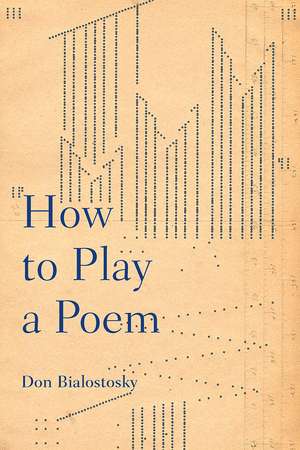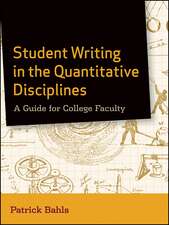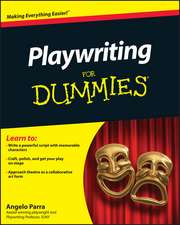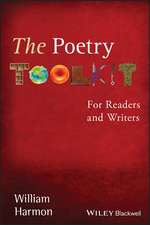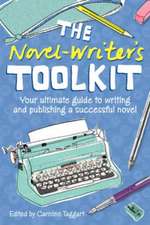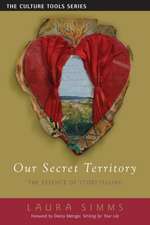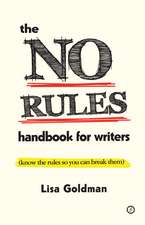How to Play a Poem: Composition, Literacy, and Culture
Autor Don Bialostoskyen Limba Engleză Paperback – 24 apr 2017
Approaching poems as utterances designed and packaged for pleasurable reanimation, How to Play a Poem leads readers through a course that uses our common experience of language to bring poems to life. It mobilizes the speech genres we acquire in our everyday exchanges to identify “signs of life” in poetic texts that can guide our co-creation of tone. How to Play a Poem draws on ideas from the Bakhtin School, usually associated with fiction rather than poetry, to construct a user-friendly practice of close reading as an alternative to the New Critical formalism that still shapes much of teaching and alienates many readers. It sets aside stock questions about connotation and symbolism to guide the playing out of dynamic relations among the human parties to poetic utterances, as we would play a dramatic script or musical score. How to Play a Poem addresses critics ready to abandon New Criticism, teachers eager to rethink poetry, readers eager to enjoy it, and students willing to give it a chance, inviting them to discover a lively and enlivening way to animate familiar and unfamiliar poems.
Din seria Composition, Literacy, and Culture
-
 Preț: 426.79 lei
Preț: 426.79 lei -
 Preț: 430.66 lei
Preț: 430.66 lei -
 Preț: 426.79 lei
Preț: 426.79 lei -
 Preț: 390.71 lei
Preț: 390.71 lei -
 Preț: 388.79 lei
Preț: 388.79 lei -
 Preț: 139.01 lei
Preț: 139.01 lei -
 Preț: 425.86 lei
Preț: 425.86 lei -
 Preț: 388.79 lei
Preț: 388.79 lei -
 Preț: 388.79 lei
Preț: 388.79 lei -
 Preț: 348.83 lei
Preț: 348.83 lei -
 Preț: 210.43 lei
Preț: 210.43 lei -
 Preț: 199.10 lei
Preț: 199.10 lei -
 Preț: 181.71 lei
Preț: 181.71 lei -
 Preț: 422.97 lei
Preț: 422.97 lei -
 Preț: 388.79 lei
Preț: 388.79 lei -
 Preț: 318.60 lei
Preț: 318.60 lei -
 Preț: 386.88 lei
Preț: 386.88 lei -
 Preț: 362.33 lei
Preț: 362.33 lei -
 Preț: 446.05 lei
Preț: 446.05 lei -
 Preț: 390.71 lei
Preț: 390.71 lei -
 Preț: 391.67 lei
Preț: 391.67 lei -
 Preț: 383.01 lei
Preț: 383.01 lei -
 Preț: 358.46 lei
Preț: 358.46 lei -
 Preț: 197.45 lei
Preț: 197.45 lei -
 Preț: 388.79 lei
Preț: 388.79 lei -
 Preț: 359.07 lei
Preț: 359.07 lei -
 Preț: 349.99 lei
Preț: 349.99 lei -
 Preț: 356.55 lei
Preț: 356.55 lei -
 Preț: 387.82 lei
Preț: 387.82 lei -
 Preț: 360.37 lei
Preț: 360.37 lei -
 Preț: 392.66 lei
Preț: 392.66 lei -
 Preț: 425.86 lei
Preț: 425.86 lei -
 Preț: 424.88 lei
Preț: 424.88 lei -
 Preț: 391.67 lei
Preț: 391.67 lei -
 Preț: 386.88 lei
Preț: 386.88 lei -
 Preț: 348.83 lei
Preț: 348.83 lei -
 Preț: 386.88 lei
Preț: 386.88 lei -
 Preț: 389.38 lei
Preț: 389.38 lei -
 Preț: 385.91 lei
Preț: 385.91 lei -
 Preț: 384.92 lei
Preț: 384.92 lei -
 Preț: 385.91 lei
Preț: 385.91 lei -
 Preț: 384.00 lei
Preț: 384.00 lei -
 Preț: 426.79 lei
Preț: 426.79 lei -
 Preț: 426.79 lei
Preț: 426.79 lei -
 Preț: 350.79 lei
Preț: 350.79 lei -
 Preț: 386.88 lei
Preț: 386.88 lei -
 Preț: 350.79 lei
Preț: 350.79 lei -
 Preț: 383.01 lei
Preț: 383.01 lei -
 Preț: 350.79 lei
Preț: 350.79 lei -
 Preț: 385.91 lei
Preț: 385.91 lei
Preț: 385.91 lei
Nou
Puncte Express: 579
Preț estimativ în valută:
73.84€ • 80.46$ • 62.22£
73.84€ • 80.46$ • 62.22£
Carte tipărită la comandă
Livrare economică 23 aprilie-07 mai
Preluare comenzi: 021 569.72.76
Specificații
ISBN-13: 9780822964377
ISBN-10: 0822964376
Pagini: 216
Dimensiuni: 152 x 229 x 20 mm
Greutate: 0.36 kg
Ediția:1
Editura: University of Pittsburgh Press
Colecția University of Pittsburgh Press
Seria Composition, Literacy, and Culture
ISBN-10: 0822964376
Pagini: 216
Dimensiuni: 152 x 229 x 20 mm
Greutate: 0.36 kg
Ediția:1
Editura: University of Pittsburgh Press
Colecția University of Pittsburgh Press
Seria Composition, Literacy, and Culture
Recenzii
"Bialostosky's "rhetorical" approach shows us how to read poems with more freedom-- and more fun."
—Jacket2
—Jacket2
"Bialostosky’s book is constantly charged by sentences like these: “Let us talk (or imagine we are talking) about utterances. Not just words but somebody’s words, not inert but enacted, not timeless but sometime, not utopian but some place.” Here, as everywhere in the book there is intense energy without a loss of sharp clarity—an exemplary version of critical thinking. And the actual assertions have the same qualities—not pretentious but strong and telling, bringing lively sense to the talk of poetry often muddled by theoretical ambitions to impose interpretive practices that simply do not fit what Bialostosky shows are the two fundamental properties of poetry—the invitation to “play” that combines following a score with participation in dramatic role-playing, and the invitation to readers to participate in the imagined recreation of delivered utterances at once in time and in another kind of social space. Add to this superbly sensitive and often imaginatively brilliant reading of poems and you have that rarest of all critical books—something that will be actively read for generations."
—Charles F. Altieri , University of California, Berkeley
—Charles F. Altieri , University of California, Berkeley
“Bialostosky achieves a rare combination: a contribution to poetics-scholarship, in a technical and fine-grained rhetoric, that informs the professional reader, with a steady stream of novel insights. Bialostosky also contributes to teaching poetry-resistant student readers how to use what they already have, in their possession of living English.”
—Donald Wesling, professor emeritus, University of California, San Diego
—Donald Wesling, professor emeritus, University of California, San Diego
“Bakhtin loved poetry and could recite it for hours, but as a theorist he was somewhat lyricophobic. Dialogic potentials were better served by novels. Don Bialostosky, one of the first and most passionate Western scholars of poetry to take Bakhtin beyond his own word, addresses in this new study the classroom art of animating a poem: how to equip readers to enter the poetic utterance, participate in performing it, and co-create its wisdoms and pleasures. A smart, effective, infectious book that Bakhtin would have treasured.”
—Caryl Emerson, Princeton University
—Caryl Emerson, Princeton University
Notă biografică
DonBialostosky is professor of English and chair of the English department at the University of Pittsburgh. He is the author of Mikhail Bakhtin: Rhetoric, Poetics, Dialogics, Rhetoricality; Wordsworth, Dialogics and the Practice of Criticism; and Making Tales: The Poetics of Wordsworth's Narrative Experiments.
Descriere
Bialostosky aims to teach the reading of poetry and to advance an intellectual argument that brings the sociological poetics of the Bakhtin School to an introduction to reading poetry.
